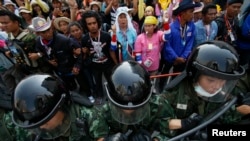Thailand's opposition is moving ahead with legal challenges to Sunday's election, which, though peaceful, failed to resolve a months-long political standoff.
The opposition Democrat Party, which boycotted the polls, said it will ask the Constitutional Court on Tuesday to disband the ruling Pheu Thai party.
A petition to be filed by the Democrats said the government tried to "grab power through unconstitutional means," by holding the early elections.
A second submission alleges the voting should not have been held during the state of emergency imposed last month to deal with pre-election violence.
Though there were no clashes on election day, turnout was less than 50 percent. In many areas, anti-government protesters blocked or disrupted voting.
Protesters vow to keep up pressure on Prime Minister Yingluck Shinawatra to resign, though demonstrations in Bangkok appear to be dwindling following the vote.
Election results are not expected for weeks, but Yingluck will almost certainly be announced as the winner.
The government said it first will hold another round of polls for the roughly 10 percent of people who were not able to vote.
U.S. State Department spokeswoman Jen Psaki Monday expressed regret that many Thais could not go to the polls.
"We remain concerned that political tensions in Thailand are posing challenges to the democratic institutions and processes of Thailand. We certainly don't take sides, as you know, in Thailand's political disputes. But we continue to urge all sides to commit to sincere dialogue," said Psaki.
Psaki further said the U.S. "certainly" does not want to see a coup in Thailand. The military, which has staged 18 coups in the past 81 years, has said it will not interfere unless absolute necessary.
U.N. Secretary General Ban Ki-moon also said he is "concerned that a number of Thai people were not able to exercise their right to vote," although he said he recognizes "the complexity of the situation."
Ban also stressed that political differences should be resolved through dialogue and said, "any action that undermines democratic processes and hinders the democratic right of the Thai people cannot be condoned."
Protests and violence first erupted three months ago, when the prime minister sought to grant amnesty to her brother, former prime minister Thaksin Shinawatra.
Bangkok's urban middle class and royalist elite are opposed to the amnesty and have responded to its proposal with calls to oust the government.
Thaksin, who was ousted in a 2006 military coup, remains very influential in Thailand, even though he was convicted of corruption. He lives in self-imposed exile in Dubai.
Protesters say the vote should not have been held before widespread reforms took place, while Prime Minister Yingluck insisted the election was the only legitimate way to end the political stalemate.
The election commission had called for the vote to be delayed, citing fears of violence that has killed at least 10 people since November.
The Thai army increased its presence in the capital to prevent further unrest during the elections and a state of emergency has already been declared.
The opposition Democrat Party, which boycotted the polls, said it will ask the Constitutional Court on Tuesday to disband the ruling Pheu Thai party.
A petition to be filed by the Democrats said the government tried to "grab power through unconstitutional means," by holding the early elections.
A second submission alleges the voting should not have been held during the state of emergency imposed last month to deal with pre-election violence.
Though there were no clashes on election day, turnout was less than 50 percent. In many areas, anti-government protesters blocked or disrupted voting.
Protesters vow to keep up pressure on Prime Minister Yingluck Shinawatra to resign, though demonstrations in Bangkok appear to be dwindling following the vote.
Election results are not expected for weeks, but Yingluck will almost certainly be announced as the winner.
The government said it first will hold another round of polls for the roughly 10 percent of people who were not able to vote.
U.S. State Department spokeswoman Jen Psaki Monday expressed regret that many Thais could not go to the polls.
"We remain concerned that political tensions in Thailand are posing challenges to the democratic institutions and processes of Thailand. We certainly don't take sides, as you know, in Thailand's political disputes. But we continue to urge all sides to commit to sincere dialogue," said Psaki.
Psaki further said the U.S. "certainly" does not want to see a coup in Thailand. The military, which has staged 18 coups in the past 81 years, has said it will not interfere unless absolute necessary.
U.N. Secretary General Ban Ki-moon also said he is "concerned that a number of Thai people were not able to exercise their right to vote," although he said he recognizes "the complexity of the situation."
Ban also stressed that political differences should be resolved through dialogue and said, "any action that undermines democratic processes and hinders the democratic right of the Thai people cannot be condoned."
Protests and violence first erupted three months ago, when the prime minister sought to grant amnesty to her brother, former prime minister Thaksin Shinawatra.
Bangkok's urban middle class and royalist elite are opposed to the amnesty and have responded to its proposal with calls to oust the government.
Thaksin, who was ousted in a 2006 military coup, remains very influential in Thailand, even though he was convicted of corruption. He lives in self-imposed exile in Dubai.
Protesters say the vote should not have been held before widespread reforms took place, while Prime Minister Yingluck insisted the election was the only legitimate way to end the political stalemate.
The election commission had called for the vote to be delayed, citing fears of violence that has killed at least 10 people since November.
The Thai army increased its presence in the capital to prevent further unrest during the elections and a state of emergency has already been declared.












